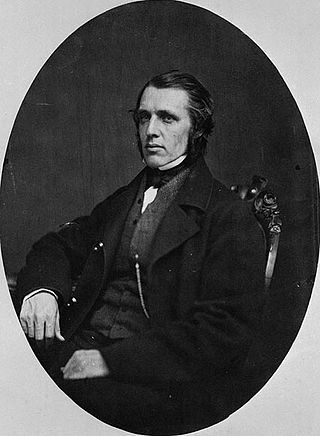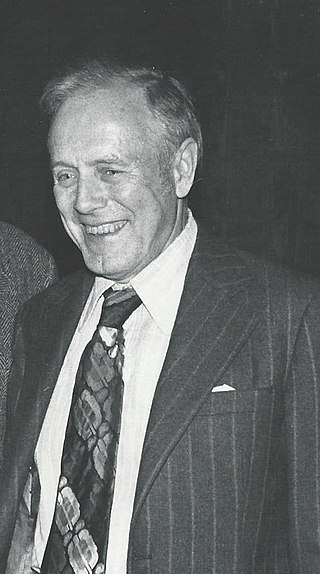Related Research Articles
This is a list of Canadians, people who are identified with Canada through residential, legal, historical, or cultural means, grouped by their area of notability.

Allan J. Pinkerton was a Scottish-American cooper, abolitionist, detective, and spy, best known for creating the Pinkerton National Detective Agency in the United States and his claim to have foiled a plot in 1861 to assassinate president-elect Abraham Lincoln. During the Civil War, he provided the Union Army – specifically General George B. McClellan of the Army of the Potomac – with military intelligence, including extremely inaccurate enemy troop strength numbers. After the war, his agents played a significant role as strikebreakers – in particular during the Great Railroad Strike of 1877 – a role that Pinkerton men would continue to play after the death of their founder.

William McDougall was a Canadian lawyer, politician, and one of the Fathers of Confederation.
William Fox may refer to:

Princeton Theological Seminary (PTSem), officially The Theological Seminary of the Presbyterian Church, is a private school of theology in Princeton, New Jersey. Founded in 1812 under the auspices of Archibald Alexander, the General Assembly of the Presbyterian Church (USA), and the College of New Jersey, it is the second-oldest seminary in the United States. It is also the largest of ten seminaries associated with the Presbyterian Church.

Huron University College is a university college affiliated with the University of Western Ontario in London, Ontario, Canada. Incorporated on 5 May 1863, Huron is the founding institution of the University of Western Ontario.
McKay, MacKay or Mackay is a Scottish surname. The last phoneme in the name is traditionally pronounced to rhyme with 'eye', but in some parts of the world this has come to rhyme with 'hey'. In Scotland, it corresponds to Clan Mackay. Notable people with the surname include:
The Interviews: An Oral History of Television is a project of the nonprofit Academy of Television Arts & Sciences Foundation in North Hollywood, Los Angeles, that records interviews with notable people from all aspects of the television industry.

James Gooden Exum Jr. also known as Jim Exum is an American jurist who served on the North Carolina Supreme Court from 1975 to 1994, and as chief justice from 1986 to 1994.

William Thornton Rickert Fox, generally known as William T. R. Fox, was an American foreign policy professor and international relations theoretician at the Columbia University. He is perhaps mostly known as the coiner of the term "superpower" in 1944. He wrote several books about the foreign policy of the United States of America and the United Kingdom. He was a pioneer in establishing international relations, and the systematic study of statecraft and war, as a major academic discipline. National security policy and an examination of civil-military relations were also focuses of his interests and career. He was the founding director of Columbia's Institute of War and Peace Studies and held the position from 1951–1976.
John MacKay, Mackay, or McKay may refer to:

William McKay Wright was a lawyer and political figure in Quebec, Canada. He represented Pontiac in the House of Commons of Canada as a Liberal-Conservative member from 1872 to 1878.
The study and teaching of philosophy in Canada date from the time of New France. Generally, Canadian philosophers have not developed unique forms of philosophical thought; rather, Canadian philosophers have reflected particular views of established European and later American schools of philosophical thought, be it Thomism, Objective Idealism, or Scottish Common Sense Realism. Since the mid-twentieth century the depth and scope of philosophical activity in Canada has increased dramatically. This article focuses on the evolution of epistemology, logic, the philosophy of mind, metaphysics, ethics and metaethics, and continental philosophy in Canada.
Anthony Glyn Evans was Alcoa Professor of Materials, professor of Mechanical Engineering, director of the Center for Multifunctional Materials and Structures and co-director for the Center for Collaborative Engineering Research and Education at the University of California, Santa Barbara, United States.
Joseph William McKay (Mackay) (31 January 1829 – 17 December 1900) was a fur trader, businessman, politician and explorer who had a long career in the employ of the Hudson's Bay Company in Canada.
The Dufferin Medal was a Canadian award instituted in 1873 by the Earl of Dufferin — Canada's third Governor-General who served in that role from 1872 to 1878. The Dufferin Medal was an official British commendation to Canadian students and athletes who had achieved high excellence in academics and athletics. Lord Dufferin and Lady Dufferin presented the medals to honorees, annually, through the end of their appointment in 1878. Dufferin Medals were the forerunner to Governor General's Awards. While gold, silver, and bronze denoted first, second, and third, acknowledgement in biographies often only reference the "Dufferin Medal". Gold medals in proficiency categories — where competition was not involved — were rarely awarded.
The Victoria 18 is an American trailerable sailboat that was designed by Canadian G. William McVay. It was built in the United States 1977 to 1983.